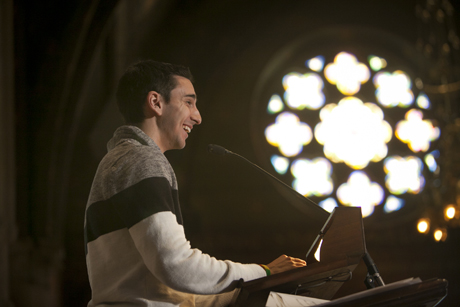DeProspo reconciles faith, sports and being gay
By Nancy Doolittle

What is it like to be a collegiate soccer player – and be gay?
Ask Atticus DeProspo ’15, who described his journey of self-acceptance to reconcile these aspects of his identity at Soup and Hope, March 13 in Sage Chapel.
“Saying those simple words, ‘I am gay,’ to myself was one of the most liberating experiences in my life,” DeProspo said, noting that he “came out” about a year ago. “It was the first step toward becoming comfortable fully in my skin.”
To get to that point, DeProspo had to work through self-hatred, frustration and confusion, he said. He initially believed that being gay was a sin against God and nature, and his sports involvement exposed him to the homophobic, demeaning sentiments voiced by some of his peers, who valued strength and “traditional” masculinity and used the word “faggot” to describe weak or ineffective male athletes.
DeProspo credits the sports world for giving him strength not just on the soccer field but to accept who he is. He also credits the “guidance and love” of his family, teammates, friends and mentors for helping him on his journey.
Beth Livingston, ILR assistant professor, for example, provided him with the support he needed when he was most conflicted. When DeProspo took her introductory human resource management class, he was struck by her openness and her convictions around gender and work/family issues. Later in the year, he asked her for a recommendation for a summer internship. In the course of their discussion, DeProspo came out to her, after which they continued to meet to discuss ways to address his conflicts.
His relationships with his teammates, he said, have become more genuine. Coming out to his two closest teammates was difficult, he said. One, “the most masculine guy I know,” was totally accepting and supportive when DeProspo came out. The teammate said, “Dude, it’s all chemical, man, I got your back.”
When DeProspo started to tell his other close friend that he was gay, he began to cry, out of shame and embarrassment. His friend hugged him and assured DeProspo of his continuing friendship.
These experiences, and the writings of professional soccer player Robbie Rogers about his own experiences as a gay athlete, convinced DeProspo that the most important part of self-acceptance is finding trust and acceptance by others. Now, he feels, he needs to “pay it forward.”
Thus, DeProspo started a chapter of Athlete Ally at Cornell. “The young people out there struggling to accept themselves should not give up on their dreams of playing soccer, or tennis, or football or hockey,” he said. The goal of the chapter is to help people “break free of the labels that stigmatize them and box them in.”
“I play soccer at Cornell. I give tours to prospective students, I advise residents in the freshman dorms, and I do many other things,” he said. “I am embracing all of who I am. I look forward to the future: If any country can adopt the tolerance and respect for others that will lead to the breakdown of stereotypes that pervade sports, America is that country. If any college can do it, it is Cornell.”
Editor's Note: This article was amended in March, 2019.
Media Contact
Get Cornell news delivered right to your inbox.
Subscribe